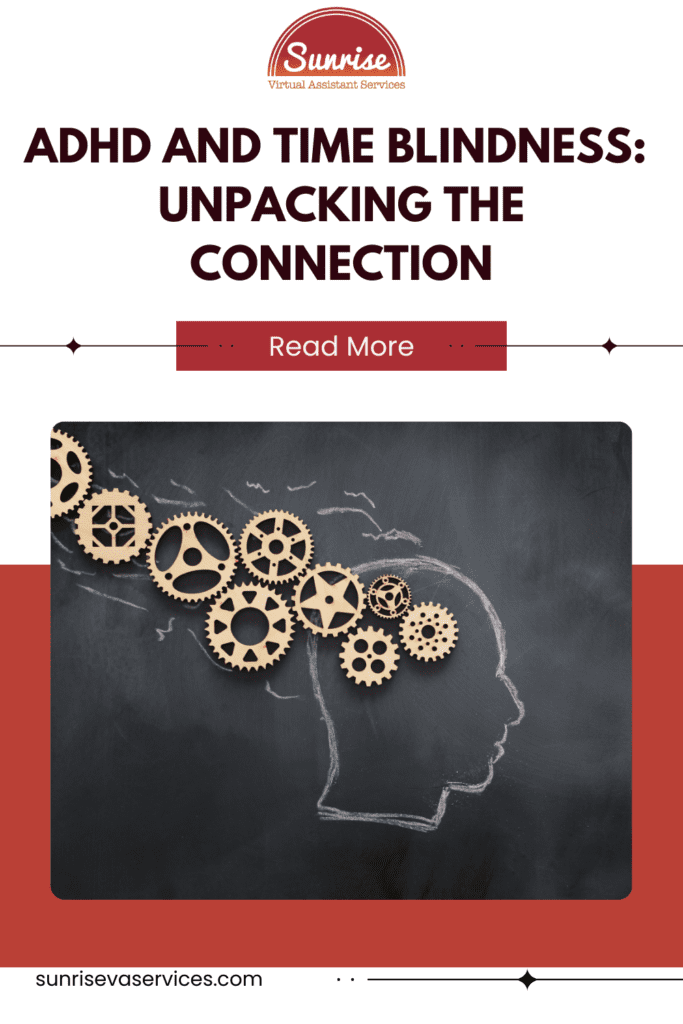From missed deadlines to chronic lateness, many with Attention Deficit Hyperactivity Disorder (ADHD) experience time blindness—a phenomenon where time seems to slip away unnoticed. This struggle with time perception affects diverse aspects of daily life. It’s important to understand the connection between ADHD and time blindness for anyone navigating this neurodevelopmental disorder.
Are you curious about the connection between ADHD and time blindness? Keep reading to gain some clarity, and know that you’re not alone.
What is ADHD Time Blindness?
“ADHD and time blindness” often go hand-in-hand, as individuals with ADHD frequently find it difficult to track the passage of time. But is time blindness real?
Unlike neurotypical people who can easily maintain an awareness of time, those with ADHD may perceive time differently due to brain differences in the prefrontal cortex and executive functioning. This part of the brain is responsible for organizing, planning, and executing tasks, which are crucial for effective time management.
While some people have misused the term to make excuses for poor performance, this is an actual (albeit undiagnosable) condition that affects many people.
The Relationship Between ADHD and Time Perception
The ADHD brain experiences time blindness due to unique cognitive functions and dopamine dysregulation.
Dopamine deficiencies can lead to impulsive behaviors and difficulty maintaining focus, affecting how individuals experience the present moment and anticipate future events.
This temporal myopia—a short time horizon—results in challenges like poor time estimation and time reproduction.
Because the concept of time becomes abstract, it’s generally hard for some neurodivergent individuals to complete tasks within a set amount of time or prepare for upcoming events.
Impact of Time Blindness on Daily Life
How is life impacted when you don’t have the ability to gauge time?
Time blindness can significantly impact the lives of people with ADHD, or even ADD (attention deficit disorder), making it challenging to manage daily tasks, adhere to due dates, and maintain social relationships.
Being chronically late isn’t just a “quirk.” Time blindness is not just about taking longer than average to drive a few minutes down the street to grab a few groceries on the way home.
Imagine thinking you could accomplish a task in 15 minutes, only to realize an hour has passed before you know it.
That’s because without a sense of time, some activities become overwhelming, often resulting in chronic lateness and last-minute rushes that strain both family members and professional relationships.
If you didn’t know you couldn’t perceive time correctly, you may have often wondered why everything seems so easy for others but not for yourself. Many young adults, in particular, may struggle to balance their responsibilities, such as work, study, and social commitments, due to time blindness.
Example: A student with ADHD
Let’s talk about Andy, a college student with ADHD who finds it challenging to allocate time effectively for studying, attending classes, and socializing with friends. Does Andy sound familiar to you?
Despite setting reminders and alarms, Andy often underestimates how long tasks will take, resulting in missing assignment deadlines and poor performance.
Socially, Andy might unintentionally arrive late to gatherings or forget plans with friends, causing tension in relationships.
These ongoing challenges highlight the profound impact of time blindness on daily life, emphasizing the need for tailored strategies and support to help individuals with ADHD manage their time more effectively.
Example: A Professional Working From Home with ADHD
Imagine a freelance graphic designer named Alex who works from home and has ADHD.
Alex’s talent and creativity know no bounds, but time blindness often turns a flexible workday into a series of near-misses with project deadlines.
Without the structure of a traditional office, time unpredictably ebbs and flows, turning minutes into what seems like mere seconds.
Despite efforts to plan and use digital calendars, Alex frequently becomes engrossed in design work, losing track of hours. This scenario leads to late submissions and overworking towards deadlines, which can be stressful and impact Alex’s mental well-being.
To manage and thrive professionally, Alex employs several supportive strategies. Established routines and physical reminders, like a visible wall clock or a timer, assist in delineating work periods from breaks, preventing burnout.
Utilizing productivity tools that break tasks into manageable chunks also enhances Alex’s ability to stay focused and meet client expectations.
By embracing these supportive measures, Alex can harness creativity while maintaining a professional track record and living a balanced life at home.
But how should a real-life person pivot themselves from being like Andy, to Alex?
Practical Strategies to Improve Time Management
Practice doesn’t make perfect, but it can help you avoid those setbacks and pitfalls. Although time blindness is a common experience for those with ADHD, there are practical strategies that can help improve time perception and productivity:
Use of Timers and Clocks
Digital clocks and analog clocks can serve as constant reminders of the actual time. Visual timers can clearly represent how much time is left for specific tasks, helping neurodiverse individuals keep track of their activities.
Leverage Technology
Digital calendars and visual schedules can offer structure, while tools like the Pomodoro Technique or method emphasize taking short breaks to maintain intense concentration and productivity. Many find added benefits in apps that provide reminders and alerts for upcoming tasks.
Establish Buffer Time
Allocate extra buffer time around tasks to account for any unpredictability. This can be especially helpful in avoiding overwhelming emotions or worst-case scenarios when dealing with tight schedules.
If you need help figuring out how much time to buffer, drilling down the actual time spent of tasks can help. This free ADHD time tracker can help you take notes and find those “time sucks.”
Implement Sticky Notes and To-do Lists
Sometimes we just need something to call our attention. Visual cues such as sticky notes and to-do lists can enhance executive functioning by keeping important tasks in sight. These visual aids serve as gentle reminders to check off items as they are completed.
Seek Support
Working with an ADHD coach or healthcare provider can provide personalized strategies tailored to individual challenges. They can offer insight into improving executive functions and mitigating the symptoms of ADHD.
Finding online support groups with other neurodivergent adults is also a great way to discover new techniques and insights to time blindness challenges.
The Role of Professional Guidance
Clinical research continues to shed light on the relationship between ADHD and time blindness, offering hope and solutions for those affected.
For many, managing time blindness begins with acknowledging the challenges and seeking guidance. ADHD medication can also support individuals by enhancing focus and reducing impulsivity, which can improve time perception.
Conclusion
Understanding and addressing ADHD and time blindness is essential for improving your quality of life and achieving both your personal and professional goals. By adopting practical strategies and seeking support, individuals with ADHD can develop better time management skills and enjoy a more balanced lifestyle.
If you or someone you know is struggling with ADHD and time blindness, remember that you are not alone. With the right tools and guidance, you can enhance your sense of time and improve overall productivity. Explore resources and connect with professionals who specialize in ADHD to start your journey toward better time management today.


